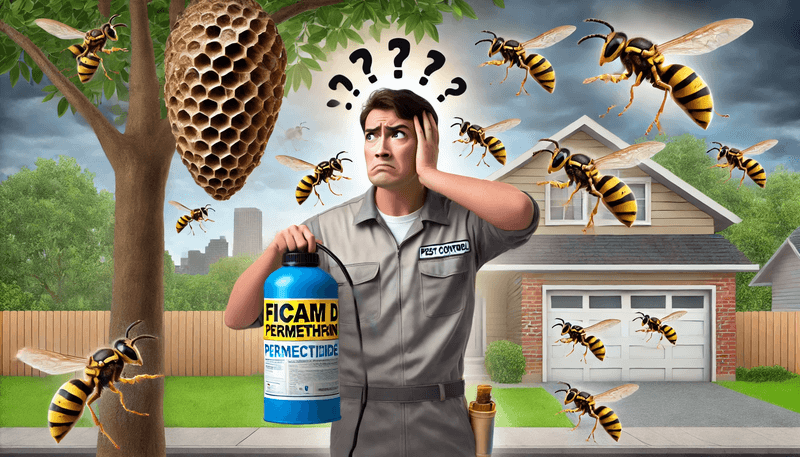
Ficam D Withdrawal: Government Decision Puts Lives at Risk
In a move that has ignited outrage and concern within the pest control industry and beyond, Bayer has officially withdrawn its highly effective insecticide, Ficam D (bendiocarb), from the UK market. This decision comes on the heels of indications from the government that Bayer might not receive a license for the product at its next licensing date. The implications of this withdrawal are profound and troubling, particularly for vulnerable populations who rely on effective pest control solutions. The consequences extend beyond the realm of business; they delve into the crucial issue of public safety.
The Impact of Ficam D's' Withdrawal
Ficam D has long been a go-to solution for pest controllers, especially when dealing with wasp nests in hard-to-reach areas. The insecticide's unique formulation—a very fine powder—allowed it to spread thoroughly throughout the nest and its surroundings. This ensured the entire area was effectively contaminated, neutralizing threats without agitating the wasps. With an impressive success rate, Ficam D has proven to be a reliable solution for professionals. Importantly, Ficam D has been used for decades without incident, making it a trusted choice among pest controllers. This long history of safe application underscores the concerns surrounding its withdrawal. With its removal from the market, pest controllers find themselves in a precarious position, as effective alternatives are few and far between. The primary substitute, permethrin, offers a different level of performance. Its heavier consistency means it spreads less effectively, resulting in a higher likelihood of incomplete treatments. Moreover, permethrin tends to agitate wasps, increasing the risk of stings for pest controllers and homeowners. In an industry where safety is paramount, the withdrawal of Ficam D raises alarms about the alternatives' efficacy.
Vulnerable Populations at Risk
One of the most alarming consequences of this withdrawal is the heightened risk it poses to vulnerable individuals, particularly those with allergies to wasp stings. For many people, a single sting can trigger severe allergic reactions, including anaphylaxis, which can be life-threatening without prompt medical attention. The absence of a reliable solution like Ficam D puts these individuals in an increasingly precarious situation. Pest controllers frequently receive requests for wasp nest removal from homeowners who are acutely aware of the dangers posed by these stinging insects, especially when children or allergy sufferers are involved. The ability to treat these nests effectively and safely has now been compromised. Without Ficam D, pest controllers are left with less effective options that may require multiple treatments, increasing exposure to risk. This is not merely an inconvenience; it's a matter of life and death for some individuals.
Economic Fallout and Escalating Costs
The economic implications of Ficam D's removal from the market are significant. Pest control businesses face the daunting task of finding alternative solutions that not only work but also fit within their clients' budgets. With permethrin being less effective and potentially more dangerous, pest controllers may need to raise their prices to cover the additional costs associated with repeat treatments and the inevitable failures of these alternatives. As treatment prices rise, consumers will be forced to bear the burden of this shift. Many families are already struggling with rising living costs, and the added expense of pest control services could lead to difficult choices—choices that may put their safety at risk. The reliability that consumers once associated with pest control services is now under threat, potentially damaging reputations and driving customers away.
Government Accountability and Public Safety
The government's role in this decision cannot be overlooked. By indicating that Bayer may not receive a license for Ficam D in the future, they have inadvertently put countless individuals at risk. This raises critical questions about accountability and transparency in regulatory practices. Are decisions regarding pesticide licensing being made with public safety as the top priority, or does pressure from animal rights groups influence them? While officials may argue that restricting pesticide use is part of a broader initiative to protect the environment, the immediate consequences for public health are alarming. Here, we have a product that has been deemed safe and effective for years, now sidelined in favor of alternatives that may not provide the same level of efficacy. The question remains: who is ultimately responsible for the potential dangers posed to the public?
The Future of Pest Control
Looking ahead, the future of pest control in the UK appears uncertain. While bendiocarb, the active ingredient in Ficam D, has not been outright banned, the reality is that no products utilizing it are currently available on the market. Pest controllers urgently need a reliable alternative that offers the same effectiveness and safety as Ficam D. The stakes are high, and lives are at risk. The situation is fraught with anxiety for those who depend on pest control services. As consumers await a suitable replacement for Ficam D, many are left wondering how they will protect their homes and families from the threat of wasps. The current alternatives do not instil confidence, and the economic implications only heighten the urgency of finding a solution.
Conclusion
The withdrawal of Ficam D from the UK market is not just a business decision but a matter of public safety. As pest controllers navigate the challenges of inferior alternatives, the risks to vulnerable populations grow more significant. The government must reassess its stance on bendiocarb and prioritize public safety over regulatory hurdles that could leave individuals exposed to danger. In an age where effective pest control is essential, we cannot afford to compromise on safety. The lives of countless individuals depend on it, and it is imperative that we advocate for solutions that prioritize health and well-being above all else.
